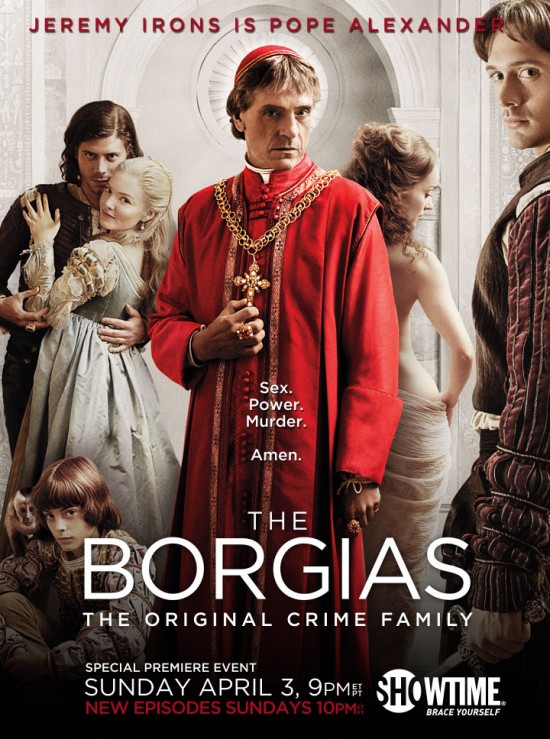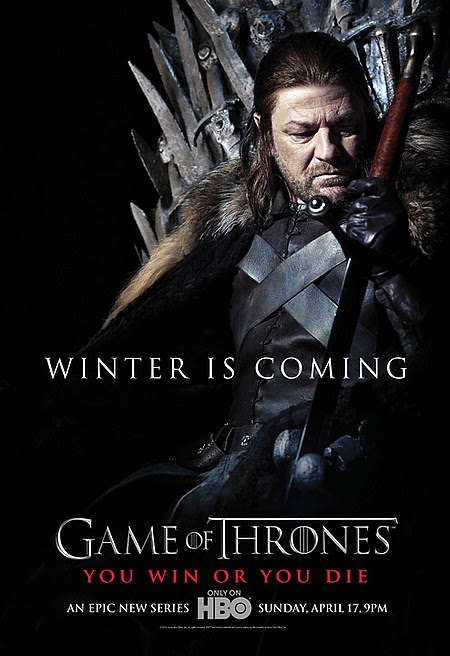Epic family drama. I cut my teeth on 80’s classics like The Thornbirds and Lace, and—more recently—was a huge fan of HBO’s Rome.
This Spring brought two promising series: Showtime’s The Borgias and HBO’s Game of Thrones. I’ve been DVR’ing both shows, and greedily watching them (in my pajamas) on Saturday mornings.
This week, I shall render judgment and declare one show the victor of the battle of my invention: Mini-Series Wars.
Some might say: it’s not a fair fight, they’re totally different genres, blah, blah, blah. I say the shows are similar enough. Look at the common tropes.
The perennially beleaguered family patriarch: Jeremy Irons’ Rodrigo Borgia vs. Sean Bean’s Eddard Stark.
The seductive villainess: Holliday Grainger’s Lucrezia Borgia vs. Lena Headey’s Cersei Lannister.
The brooding villain: Francois Arnaud’s Cesare Borgia vs. Nikolaj Coster-Waldau’s Ser Jaime Lannister.
Plus, despite the disparate genres, both tread the same theme: the struggle for political power.
There are things to recommend each series.

The Borgias recreates a fascinating time in European history, centered around the scandalous Rodrigo Borgia who bought the papacy.

Game of Thrones brings to life a medievalish world based on George R.R. Martin’s epic fantasy novels.
The Borgias has halting sequences that are violent but effective, a few young actors who are easy on the eyes—Elyes Gabel (Prince Diem) who died too soon—and a scene stealing Holliday Grainger portraying Lucrezia Borgia in her formative years.
Game of Thrones has epic landscapes befitting its epic range, many original, compelling characters—Peter Dinklage’s Tyrion Lannister is my favorite—and a decent gay romance between King Robert’s younger brother Renly and the knight Ser Loras.
(The Borgias has nothing gay going on, unless you count Augustus Prew’s fey and demented Alphonso II of Naples, and let’s not).
Both series rely on complex political storylines, which can be difficult to render without dim sequences in which the characters recount their history, as though it’s the kind of thing they would naturally go on about with their bedmate after a vigorous snogging. The Borgias uses this device too frequently, I’m sorry to say. Rodrigo Borgia quizzing his youngest son on the regions and rulers of Italy—in front of a map, no less—is one such flat contrivance.
Game of Thrones struggles with exposition as well, from the other side of the spectrum, i.e. spare explanation. Five episodes in, I still can’t say I understand the relationships between some of the characters, or remember their names, there’s so damn many of them.
So who wins the mini-series war?
I give it to Game of Thrones.
The deciding factor is character portrayal and development, and The Borgias, with all its rich material—the opportunity to bring a new spin to one of the most notorious families in history—doesn’t quite deliver.
It tries to cast light and shade on the villainous Borgias—succeeding to a degree via Irons’ Rodrigo and Grainger’s Lucrezia—but the other two main characters, brothers Cesare and Juan, are too lackluster to care about. The acting is questionable but equally they don’t have much to work with. The story does little to explore their motivations beyond a duty to protect their family, and their personal status as Italian Renaissance studs (yawn).
Minor characters do better, such as Colm Feore’s Cardinal Della Rosa, who confronts the inhumanity of a war he started, but there’s not enough of these subtle moments.
Game of Thrones is not without its weak spots. (Harry Lords’ poutily one-dimensionsal Viserys Targaryen leaps to mind). But overall, there are plenty of characters to get behind, whether from the sincerity of their convictions—the bastard John Snow who wants to join the Night’s Watch—or guilty pleasure of rooting on a compelling bad guy, like Ser Jaime Lannister, or bad girl, vis-a-vis his sister Cersei.
Now, if I could figure out why Danaerys Targaryen being pregnant is such a threat to the entire kingdom, it would be all good.

Awesome blog.Thanks Again.